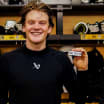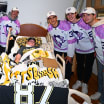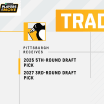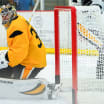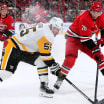When Sami Kapanen arrived home at 2 or 3 o'clock in the morning after a road trip early in his NHL career, he would only get a few hours of sleep before his oldest son, Kasperi, would wander into his bedroom.
"You get woken up at six, seven o'clock in the morning, and there's a little guy standing next to the bed giving you the hockey stick, like let's go," Sami recalled with a laugh.
Like Father, Like Son
Former NHLer Sami Kapanen on Kasperi's hockey journey back to Pittsburgh
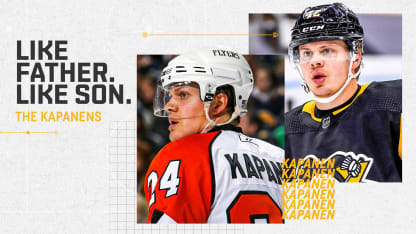
That little guy is now 24 years old and in his first season with the Penguins after the organization originally drafted him in the first round (22nd overall) in 2014. So now that Sami is back in their native Finland, which is seven hours ahead of East Coast time, sometimes his nights are just getting started at 2 a.m. if the Penguins play at 7 p.m.
"I stayed up the other night to watch Kasperi play," said Sami, a player agent who works with the agency which represents the likes of Kris Letang, Patrice Bergeron and Mitch Marner. "I watched the first two periods, and then you get to the point that the whole Saturday is messed up. So it's better to kind of get a good sleep and to watch the next morning."
But no matter what time of day or night it is, it's been amazing for Sami to watch Kasperi grow into the person and player that he is today, and carry on the Kapanen family legacy in the game of hockey.
It all started with Sami's father, Hannu, a Finnish hockey legend that played nine seasons in Liiga, the country's top professional league, and represented Finland at the 1976 Olympics and Canada Cup.
It continued with Sami, who played 831 NHL games over 12 seasons with Hartford, Carolina and Philadelphia. He had five 20-goal campaigns, helped the Hurricanes reach the 2002 Stanley Cup Final, played for Finland at the 1998 and 2002 Olympics. He also spent many years playing for the KalPa organization of Liiga, both before he was drafted by the Whalers in the fourth round (87th overall) in 1995, and after his NHL career, when he was also a part-time owner and GM of the club.
And it carries on now with Kasperi, who returned to the Penguins after spending the previous five seasons with the Toronto Maple Leafs organization, where he grew and developed after Pittsburgh sent him there as part of the Phil Kessel deal in the summer of 2015. Kasperi already has two goals and five points in six games played as of Jan. 31.
"The level he is at right now is pretty awesome," Sami said. "It's just unfortunate with the visa thing that his arrival was delayed, and it was not the best possible start for him. But he was happy and excited to go back to Pittsburgh and finally get to play over there even though it's been a five, six-year delay on it. He's excited about it. And now he feels like he's coming in as a solid NHL player instead of a young kid. It's a lot of change since the draft year."
\\
Kasperi was born on July 23, 1996, while his parents were spending the offseason back in Finland following Sami's first professional season in North America, where he appeared in 35 games for the Whalers.
The Kapanen family spent one more year in Hartford before the franchise moved to Carolina, and it was there that Kasperi took the ice for the first time.
"It was an early, early age," Sami said. "I think we found the smallest Bauer skates that we could get and let him try. He took a little bit of time to figure it out, but he liked it so much that he kept trying."
And from there, Sami said he literally couldn't get the stick out of Kasperi's hands, especially whenever he accompanied his dad to PNC Arena during his five-plus seasons in Raleigh.
"Pretty much every time he came to the rink, even just as a tiny, tiny, small kid, he had a hockey stick," Sami said with a laugh. "He liked to walk around with the stick and look for an opportunity to play. And if there's no stick, the kids, they find their way - using a broom or some kind of a stick and a piece of tape and playing with that. I think it is sometimes tiring for parents (laughs). It seems like there's nothing else but there's hockey."
Kasperi always liked watching, but loved playing more. Sami said he would copy certain moves that players tried and pretended to be the ones he really liked, always trying to get a feel for plays. Kasperi would then constantly try to recruit everyone around him to join.
Like Penguins amateur scout Tommy Westlund, who was drafted by the Hurricanes in 1998, made the team ahead of the 1999-00 season and immediately bonded with Sami because of their shared European background. They roomed together on the road and lived just 10 minutes apart from each other in Carolina, so they would organize games of street hockey with their kids, where Kasperi's fiery nature still makes them laugh to this day.
"Kasperi was very competitive," Westlund recalled. "Very, very competitive. If he lost, he just got so mad. So we had to let Kasperi win a few times."
"He got so upset if he ended up losing at home, it was better to let him win, making your own life a little bit easier," Sami agreed. "I think that's probably the one of the best things about him, that he's really emotional."
Kasperi would also enlist members of his extended family to play whenever they were back in Finland during the summers.
"Growing up, he used to put all the grandparents and the people visiting in the house in goal," Sami said. "I gave him a stick and a mini net and he was shooting on everyone. It was a mandatory thing, knowing that if they're coming into the house, that they're probably going to end up playing hockey."
After he was traded to Philadelphia during the 2002-03 season, the family lived in New Jersey for the next few years, which was about a 45-minute commute to Wells Fargo Center. Sami would juggle his own career with taking Kasperi to his own youth hockey commitments.
"On my off days, I was driving quite a lot, taking him to practices and staying over there," Sami said. "And I watched him in practice and playing games, a lot of the tournaments. So it was fun for me to see how excited somebody can get about playing games that way."
He tried to find a balance between providing support and guidance to his son, while also being careful not to overstep, which could be difficult at times. Especially since there are a lot of similarities with their games, most notably their speed and skating ability, as Sami won the Fastest Skater competition at the All-Star Game one year.
"You want to help your kid, but at the same time, not force anything or get into too much of the details," Sami said. "So I always tried to kind of talk about the value of the work and playing for a team instead of being individual and for your own glory. Trying to teach that the more you practice, the more likely that you are getting better instead of just kind of waiting for something good to happen for yourself. Go and do it."
The 2007-08 season would be Sami's last in the NHL, as he returned home to Finland to play for KalPa, the organization he was part-owner of. It was a couple years after that when Sami said they started to realize that Kasperi might actually have a real future in hockey.
"You could see at an early age that he was good, and he was probably better than others, but it's such a long way to a professional level," Sami said. "But I will say probably somewhere around age 14-15, he kept playing up a year or two, and at that point, we were starting to figure out that he could get something good done."
And when Kasperi was 16, he ended up being teammates with Sami on KalPa for the 2013-14 season.
"It's kind of hard to put into words," Sami said of playing with his son. "You are so honored and excited. That means your own career has been fairly long if your kid is grown up enough to play with you on a professional level. It was almost more surreal. We ended up scoring a goal where I got the pass from him. You start celebrating and it's your own kid that is coming to hug you. You are both kind of looking at each other almost awkwardly like okay, hey (laughs)."
\\
The following summer, the Kapanens returned to Philadelphia for the 2014 NHL Draft, which was held at the Wells Fargo Center. Sami remembers how restless Kasperi was getting as the first round progressed, and told him that going later meant that he would likely be taken by a better team. Once the Penguins took Kasperi with the 22nd pick, there was plenty of relief mixed with plenty of excitement.
"You are really getting a quality team that is going to pick you up, and it ended up being probably one of the best available," Sami said. "So I was excited about the opportunity, knowing the players that they had."
After Kasperi played the majority of the 2014-15 season with KalPa in addition to four games for Wilkes-Barre/Scranton of the American Hockey League, that summer, Sami's phone rang while he was at the grocery store.
It was Kasperi, calling to tell him that the Penguins had traded him to Toronto as part of a deal involving six players and draft picks. Pittsburgh was looking to add a proven star with goal-scoring ability and speed to their lineup, and had made Kessel their No. 1 target. And in order to secure him, Kapanen was one of the pieces the Penguins had to give up.
"We just talked about how I know that the first time is going to sting you, and it came out of the blue for him," Sami said. "But we talked about how Toronto was a young up-and-coming team, and he might have a good opportunity there."
But Sami told his son that if he wanted to become an NHL player, he needed to work on his defensive game.
"It was another one of the things that I always tried to talk to Kasperi about, that the quality of defense is going to make it easier if you want to become an NHL player," Sami said. "You need to be a reliable two-way hockey player."
That's exactly what Kasperi did during his time in Toronto. As he said after the Penguins re-acquired him on Aug. 25, he was a more one-dimensional player when he was drafted, and that everything else was lacking for him at the time.
Kapanen played the majority of his first three seasons with the AHL's Marlies, where he learned the importance of being a two-way player, adding a physical, gritty element to his repertoire along with penalty killing ability. That helped him earn a full-time spot with the NHL's Maple Leafs in 2018-19, where not only did he bring those defensive elements of his game that he had worked so hard to add - Kapanen also scored a career-high 20 goals.
Sami believes that Kasperi will be able to get back to that type of offensive production with the Penguins, as the organization believes he is a top-six winger. They had originally penciled him in to play alongside Sidney Crosby, but Kasperi has found some good chemistry on a line with Evgeni Malkin.
"As a hockey player, he's bought into becoming what he is right now, and I think he's not done yet," Sami said. "He is trying to take the next step in becoming a quality offensive player. He has the tools and just needs a little bit of a time and having the players to play with. He should be getting the opportunity now with Crosby and Malkin and company.
"He showed a lot of people, once he got to play with Auston Matthews two years ago when William Nylander had the holdout, that he can put up the numbers. So I think that's something that he's expecting himself to be capable of repeating and even topping."











